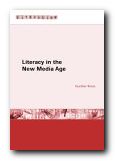theoretical study of writing in the digital age
This is an investigation of the effect of new media on what Gunter Kress calls ‘alphabetic writing’. He is arguing that multimedia and the screen are starting to challenge the page as the natural medium of writing – and that this in turn is affecting the way we write. It’s certainly true that writing for the screen has to be more immediate and heavily chunked than writing for the page, and Kress also argues that the screen is making graphic images more important as a medium of communication.
 He points out quite rightly that speech and writing are two completely separate systems (which is why many people have problems with writing). The alphabet is actually a loose transcription system for translating between them. His basic argument is that all communication (including linguistics) should be seen as a subset of semiotics. There’s actually not very much about new media discussed – merely an assumption that iconic or visual communication is challenging the dominance of writing.
He points out quite rightly that speech and writing are two completely separate systems (which is why many people have problems with writing). The alphabet is actually a loose transcription system for translating between them. His basic argument is that all communication (including linguistics) should be seen as a subset of semiotics. There’s actually not very much about new media discussed – merely an assumption that iconic or visual communication is challenging the dominance of writing.
However, he does make the interesting observation that computers put users in charge of page layout in a way which gives new emphasis to design, as well as providing interactivity between writer and reader.
Having argued that all texts are a result of ideological relationships between author and reader, he even attempts a quasi-political analysis of punctuation. This is not really persuasive, and founders in his attempts to explain or excuse his examples of what is no more than poor writing.
But he does end on an interesting topic of reading paths. That is, the manner in which readers have to construct their own navigational routes when confronting what he calls ‘multimodal’ texts – ones with pictures and words, such as magazines and web pages, for instance.
Although he claims to have left behind an academic style so as to communicate with a wider audience, he writes in a dense and rather abstract manner. The results will be of interest to linguists, educational theorists, and semiologists – though those approaching it with an interest in new media might be a little disappointed.
© Roy Johnson 2003
Gunther Kress, Literacy in the New Media Age, London: Routledge, 2003, pp.186, ISBN: 041525356X
More on literary studies
More on digital media
More on technology
More on theory